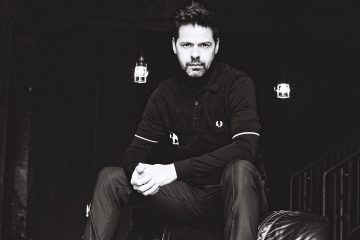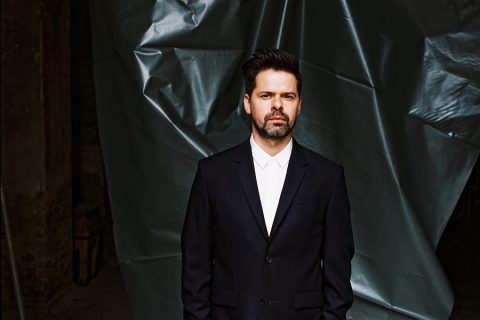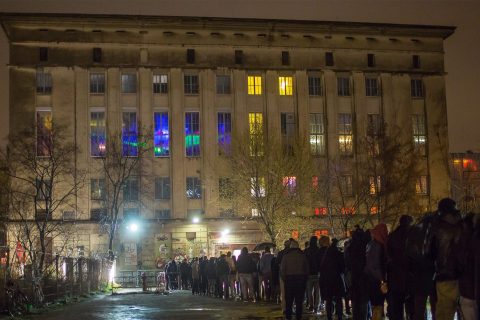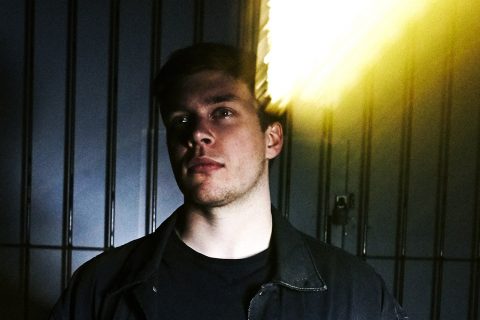Patrick Gräser’s brand of techno is one of no compromise. For Answer Code Request (ACR), the feeling an emotion behind the music is what drives everything (throw in a little bass for good measure).
The Berlin techno star’s story is one that is well documented now. His rise from anonymity in 2011 has taken him to become one of the most flexible and unique DJ’s, producers and live acts to grace stages worldwide.
Patrick’s artistry comes from a belief that is one is to make quality and new music, then one must be true to themselves. He’s quite vocal about not conforming to the 4/4 format that dominates the techno landscape.
Techno has always been about the sounds of the future, a non-stop evolution of electronic sounds. Patrick embodies this as he wants to show people something new and different, that techno can be about so much more than straight, grooveless beats.
One tool that Patrick utilises in his production method is to use sounds from his musical past and reinvent them for today’s audience. If you’ve seen ACR perform before, you’ll notice he uses a lot of broken and breakbeats mix through his set.
The ebb and flow through periods of more relaxed, even euphoric sounds through to hard driving and groovy beats broken up by different rhythms is one the hallmarks of his sets.
In February this year, Patrick released his second album titled Gens under the Answer Code Request moniker. To find out more behind the artistry behind it and his performances, I had the pleasure of chatting to him over skype. What a wonderful modern world we live in.
FS: You once said that your debut album showed you that you belong here (as a techno producer), but you still feel pressure with each release because you’re not always sure that it is of the same standard of the work that has come before. Did you feel the pressure coming into making Gens or was it an album that was created organically?
ACR: Of course there was more pressure, I wanted to finish it earlier actually. It was a long process. I travel and I have family. I always wanted to finish it earlier but I wasn’t sure if it was the right time for this type of experimental music to be released again.
I thought, “okay, this is the second album so I’ve got to be more experimental, creative and get into sound design. It’s not music just for the dance floor. It’s not just for people going into Berghain, I want to catch another audience too. You can listen to this album in the car or somewhere else. I always kept that in my mind.
The pressure was there because the first album, I think, was really good. Its normal that there is a lot of pressure to follow up with a strong second album.
FS: For Gens you wanted to reply upon what was inside you rather than on other music for inspiration.
ACR: I wanted to try something new with old ideas. I had some old ideas from previous tracks I’ve made sketched in my head and I wanted to bring some of those back but reinterpreted for today. I wanted to show people today some of the sounds from my musical past.
FS: knbn2 stands aside from the other tracks on this LP as its tone is quite light and euphoric, backed by an energetic break-beat. The texture of the bass reminds me of ‘Escape Myself’. What were you trying to express with this track?
ACR: I went back to the 90’s with this one. I reminds me of my older times playing drum n’ bass. I wanted to use some older ideas from the past and use them to show people today. Knbn2 is actually the initials of my kid’s names.
FS: That makes a lot of sense because the vibe on this track, in particular, was quite nice and euphoric.
ACR: Yeah. This track was maybe the most powerful one on the album. It was the first track that we put out 2- 3 weeks before the album was released and had a lot of good feedback from fans and colleagues.
FS: What I liked about it was that it was refreshing to hear that amongst other darker tracks. Do you think that people might forget that place that these kind of vibes have just as much a place in techno as the darker sounds?
ACR: I love to producer the darker stuff sometimes. I think the second album wasn’t too dark but people thought it was when they listened.
No, people don’t forget about it. The thing now is that we’re seeing all these DJ’s harder techno now. Sometimes I miss the groovy part of techno, not just straight 4/4 beats. People may have forgotten about the groove.
DJs play hard-hard-hard techno, and people want it even harder but in the end, it’s not my type of style. I want to play everything I like, such as a broken beat track for example. For me as a DJ, its necessary to play not only dark music.
FS: I agree. I feel like the flavour of the month or the trendy sound in techno right now is to just play very straightforward techno. There’s no variation in the music that these DJs play. I think you’re right in saying that people are forgetting about the groove.
ACR: Exactly. You have to keep the vibe going through waves of highs and lows. At some big festivals, you can’t play the sounds that you want to show the people. Because some crowds want this type of techno, you cannot play the sounds that you want to play. It can be difficult for DJing.
FS: Do you find that sometimes at these types of shows that you have to play more accessible techno to keep the crowd energies or do you usually do your thing and see what happens?
ACR: When I start (to play), I start. I will see how the crowd is but you need to focus on how the crowd is dancing. You can just feel it, you can feel what direction to take the set. But I want to show my style not just play straightforward, hard and banging techno like every other DJ. I sometimes play the harder stuff but I need my groove!
FS: You bring a blend of different sounds to your sets. You’re not just playing hard and some other sounds.
ACR: Sometimes I play a bit softer, a bit moody. This is what I need! Last week I played in Istanbul with Marcel (Dettmann and the people were waiting for us. You could play anything and the crowd was so happy about every track. They don’t get quality techno so often there so they were happy for anything. It’s good in those situations because you can build up something special for the people.
FS: Ambient pieces are placed all through your album. How would you state the importance of ambient music in techno? Do you think that ambience place in techno is overlooked by those that think 4/4 beats are what define the genre?
ACR: I think people have forgotten about ambient sounds in clubs. In the 90’s all clubs always had an ambient floor. I wonder why clubs don’t have this anymore. The music in these rooms was really interesting and special for the people that just wanted to relax.
On new years eve in Berghain, ambient music plays in the Halle space. I could play there for 3-4 hours. It’s always interesting music to just listen to. People might have forgotten that you can actually just listen to this music.
I think it’s necessary to play this ambient music for the people. Therefore I wanted these types of tracks for my album to show people that techno isn’t just about banging kick drums. Ambient you can play anywhere, at a cafe in your headphones or in your car or at a club.

FS: Do you remember what you felt after the album had been released? Was it a sense of relief or had your mind already moved onto the next project?
ACR: I was happy when the album was released because all the pressure was released. Just before Gens came out, there were lots of interviews and media around it. I put a lot of energy into this album but you just don’t know what to expect when it comes out.
After it came out I was already thinking about the next project. I’ve just moved into a new apartment so I need to settle into that, get some new gear to make some new sounds and then think about making an EP. I think it’ll be a bit more dancefloor oriented.
You never know, I might work on music so much that I could have another album on my hands. Maybe not next year but the year after.
FS: What’s your creative process when you make music? Do you think about making an EP or an album specifically?
ACR: I don’t think about whether the track I’m making is for an album, EP or a dancefloor. After I’ve made a track I think “that would be cool for an EP’ or “that sounds like an album track”. I’ll make a track, save it on my hard drive and revisit it in a few weeks.
If I like it then I’ll leave it then, make some more music and then come back to all these tracks a half a year later and then decide what to do with them. Then I might choose which tracks to make an album out of.
The second album wasn’t really a concept album. I was more thinking about putting some tracks together. Some people work track by track by track and work towards a concept. I had something like 20-35 tracks and just choose the 12 best tracks and put them together.
FS: Does that kind of creative process take the pressure away from writing music for you?
ACR: Yeah you feel the pressure when someone tells you that you have to work on music. I just try and clear my mind and work without pressure. When you work without pressure its the best.
FS: It would be hard to work especially when you have kids and touring a lot.
ACR: Yeah. I find my time when they’re at kinder or when I’m on a plan or in a hotel room. Whenever I find the time really!
FS: Do your kids like music?
ACR: My daughter is only 2 years old so she’s still small. My son is 6 years old but he’s more into other music (laughs). On the drive to kindergarten, he was singing to The Killers on the radio. He already knows the lyrics. I sat there thinking “wow, not bad”.
They pick up stuff so fast. It’s unbelievable, I wasn’t like that when I was his age. He’s very smart. We’ll see, I don’t want to push the music onto them but we’ll see. He’s still small!
FS: Do you remember what you were listening to when you were his age?
ACR: I was living in East Germany so there wasn’t much music available. I was listening to 80’s rock and the pop music at the time so I can’t quite remember.
FS: I’m always interested in how people name their productions. What’s your method when you were naming your tracks from Gens?
ACR: Most of the names on the album are Latin. They have a personal meaning to me and I wanted to try and tell a story with each track. There are some other names that aren’t in Latin but they still have meaning to me.
ACR: I think if you are relaxed, you have more time. You might do something in your studio and you feel unpressured so the sense of how valuable your time is just isn’t there. You might come back to the studio the day after you made you track and think “ppfftt, what is this?!”.
I work under pressure. I travel, I have a family and other things to do. When I’m in a rush I can just work fast because I have to. Your brain goes into a different mode. I just have to finish something.
When I do something cool I try and bring it to an end quickly to capture the idea. Sometimes when I come home and I feel like working on something, I just do it because I know I don’t have much time. It makes it more fun when you leaving producing music until you feel it’s the right time.
When you sit in your studio every day, you’re not so motivated or inspired because that energy and emotion behind the music just aren’t there. I know many people who sit in the studio every day. They have so many toys to play with but they never finish anything.
I have to finish something because I’m so happy to work on music when I have my time. It helps when you give yourself time to feel the pressure to get in the studio to work because you’ll get in there and you’ll be effective.
The best example is people post videos often of their music equipment in the studio but in the end, where is the music?
FS: You came to Australia in 2017 for Pitch Music and Arts Festival. What was the experience like for you personally? Had you played in a similar setting around the world?
ACR: Yeah that was great! Personally, it was the first edition of the festival so it was exciting to go into the bush and see it. It was so far away and out of the city. When I come to Australia it’s usually just Sydney and Melbourne. Personally for me as a fan of travel, you want to see more from the countryside and nature. But as a Dj you don’t get to do that. Its ‘fly-in-and-out’.
It was so cool to see how they build the festival. Sometimes the first edition of any festival has its issues, but not this one. Pitch was so organised and professional. The crowd was great. I got to play my sound and people were really happy and receptive.
FS: I was in the crowd watching on and you ended up playing overtime as Rodhad was late to his set. For that extra hour, you really applied more pressure on the crowd with some harder music. One particular moment which I feel really hit the crowd was when you played “Surface Noise” by Planetary Assault Systems. What goes through your head in these situations when you’re told you get to play overtime?
ACR: It’s a strong track! It was good for me to play longer and show more. 1-2 hours playing at a festival, you can’t really show people a story. It’s just a bit short and it’s not always easy when you play at a festival but the set was really cool, especially when it started to rain. We had to bring back the decks in the DJ booth because the rain was falling on it.
I planned to bring the vibe down towards the end of my set. You’ve got the last track in your mind but then I got told I could play longer so I had to think about it to bring the energy back up and take the set to the next step up.
FS: When you play your set, what percentage of the music you play is your own productions?
ACR: Sometimes. Because I play my live set, I try not to play my own music constantly. I’ll play my own music if it’s exactly the right moment to play that kind of track. If there are other tracks that might fit better into then the mix then I’ll go for that, but sometimes people want to see you play your tracks.
People hold up their phones with a message on the screen saying play this! Of course, they want to see you play your tracks so of course, I’ll do it.
FS: I respect your passion to not conform to what is trendy in the techno scene at the moment. What would be some advice for the next generation of producers that are thinking about making music a career?
ACR: They should be true to themselves first. They should do what they feel like inside. I think it’s better to make what people want, keep true to yourself and do what you like. Do just follow the hype. Also, try to be a good selector so you can do something special.
FS: Do you think that things like social media take away from being true to yourself and people just follow what’s trending?
ACR: I have to do social media because people want to see it and you have to show them something. But I think it’s making things not about the music anymore. It’s all about the person. People show so much from your private life but not from your music.
People are forgetting about the music. It’s annoying when you play somewhere and people are just on their phones filming sets but they’re not enjoying the music. They just want to post something. Things like social media can destroy the music.
I don’t get it when DJ colleagues are mixing but they also have to film at the same time.
Answer Code Request is playing this weekend in Australia with a show in Sydney on Friday 21st September at Charades Club and in Melbourne at Xe54 on Saturday 22nd September.





Comments